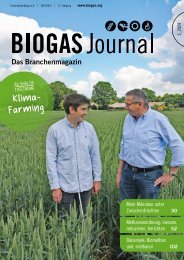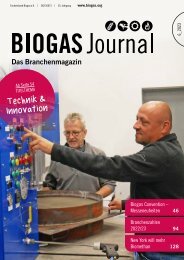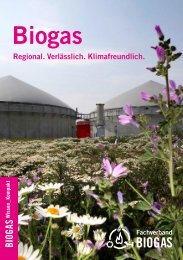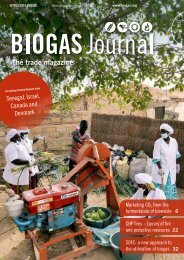Create successful ePaper yourself
Turn your PDF publications into a flip-book with our unique Google optimized e-Paper software.
Significance of waste digestion in developing countries<br />
economic and organisational conditions, unless favourable<br />
framework conditions, e.g. sufficient guarantees,<br />
incentives, feed-in tariffs, are provided by local governments.<br />
To tackle these challenges, inves<strong>to</strong>rs and<br />
opera<strong>to</strong>rs therefore need sufficient revenues and price<br />
certainties as a basis for their commitment.<br />
Some extra efforts therefore appear necessary and,<br />
since waste management is a cross-cutting task, a set<br />
of political, institutional, social, financial and technical<br />
conditions must be met if biowaste-<strong>to</strong>-biogas projects<br />
are <strong>to</strong> be successfully implemented. Countries or local<br />
and regional authorities that successfully provide such<br />
favourable framework conditions e.g. by implementing<br />
(national) strategies, providing renewable energy<br />
incentives, offering long-term contracts and ensuring<br />
price certainty for the energy generated, experience<br />
substantial increases in investments in biogas production<br />
from source-separated biowaste.<br />
In that regard, private sec<strong>to</strong>r participation is often a key<br />
driver in any project that initiates a sec<strong>to</strong>r change using<br />
new or sophisticated technologies. Business participation<br />
is valuable in mobilising investment and bringing<br />
in the operational experience needed <strong>to</strong> provide efficient<br />
services. For example, private sec<strong>to</strong>r players can<br />
achieve improved service efficiency and thereby reduce<br />
unit costs. A necessary condition when involving private<br />
stakeholders is <strong>to</strong> guarantee that enterprises can<br />
recover all the legitimate costs they incur (and profits<br />
they make) when financing, setting up and operating<br />
services. Contracting with the private sec<strong>to</strong>r therefore<br />
The German Government, and its relevant ministries are providing<br />
a number of funding and financing <strong>to</strong>ols for German enterprises<br />
that intend <strong>to</strong> jumpstart cooperation with local partners<br />
in developing countries and emerging economies, with the<br />
aim of developing and implementing a biogas project. Amongst<br />
them are programmes by the Federal Ministry for Economic<br />
Cooperation and Development (BMZ) – http://www.bmz.de/<br />
en/index.html), the Federal Ministry for Economic Affairs and<br />
Energy (BMWi – https://www.bmwi.de/Navigation/EN/Home/<br />
home.html), and the Federal Ministry for the Environment, Nature<br />
Conservation, Building and Nuclear Safety (BMU – https://<br />
www.bmu.de/en/). As an example, through the develoPPP.de<br />
programme, BMZ provides companies investing in developing<br />
and emerging countries with financial and, if required, professional<br />
support. Since 2008, the International Climate Initiative<br />
(IKI) of BMU has been financing climate and biodiversity projects<br />
in developing and newly industrialised countries, as well<br />
as in countries in transition. DEG as a subsidiary of KfW Group<br />
provides financing and consultancy <strong>to</strong> private companies investing<br />
in developing and emerging countries. Furthermore, in<br />
order <strong>to</strong> boost climate-friendly technology, DEG (Deutsche Investitions-<br />
und Entwicklungsgesellschaft), a daughter of KfW<br />
Development Bank, is running the programme “Climate partnerships<br />
with the private sec<strong>to</strong>r” on behalf of BMU, which aims<br />
at mobilising players from the private sec<strong>to</strong>r for climate protection<br />
in developing countries and emerging economies, with a<br />
focus on the promotion of technology and knowledge transfer <strong>to</strong><br />
support the development of a climate-friendly economy.<br />
depends on having a reliable understanding of the full<br />
costs involved in privately delivered services ,as well as<br />
the capacity <strong>to</strong> cover these costs from recurrent revenue<br />
streams. Setting clear mandates for the public and private<br />
sec<strong>to</strong>rs and having the appropriate skills in place<br />
on both sides are key.<br />
Animals often have<br />
direct access <strong>to</strong> biowaste<br />
collection in developing<br />
countries<br />
32

















